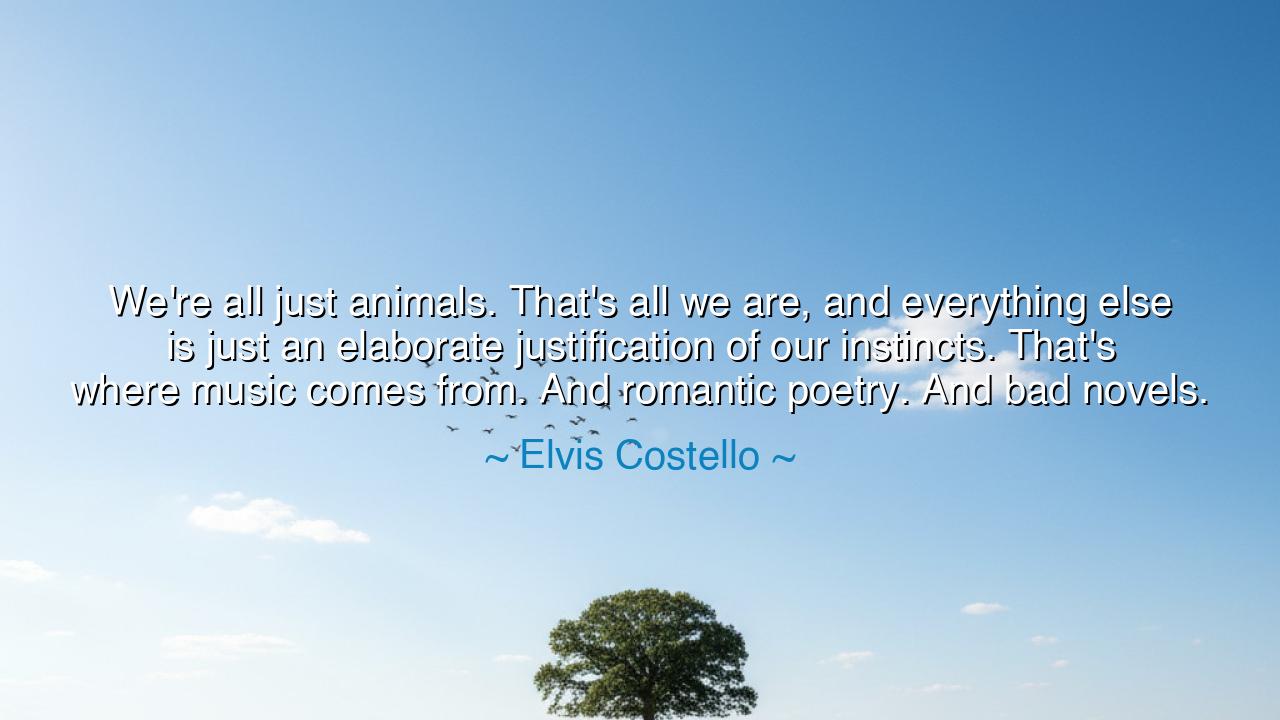
We're all just animals. That's all we are, and everything else is
We're all just animals. That's all we are, and everything else is just an elaborate justification of our instincts. That's where music comes from. And romantic poetry. And bad novels.






"We're all just animals. That's all we are, and everything else is just an elaborate justification of our instincts. That's where music comes from. And romantic poetry. And bad novels." – Elvis Costello. In these words, Costello reveals a profound, and perhaps uncomfortable, truth about human existence: beneath the layers of culture, civilization, and sophistication, we remain driven by our most primal instincts. He suggests that the very things we elevate—art, music, poetry, and even literature—are simply expressions of our deep, instinctual urges. We may dress these desires up in grand ideas and high ideals, but at their core, they are manifestations of the same animalistic impulses that govern all life. In a sense, Costello’s statement challenges us to acknowledge that art is not separate from the raw, unfiltered forces of nature but is, in fact, deeply intertwined with them.
The idea that humans are driven by instincts is an ancient one. In the Greek tradition, Aristotle argued that humans, though more intelligent than animals, are still bound by the same basic drives—hunger, sexual desire, and the need for survival. In his Nicomachean Ethics, Aristotle suggests that true happiness comes not from suppressing these instincts but from understanding and harmonizing them with reason and virtue. Even the great philosophers acknowledged the animal nature of human beings; they believed that the highest form of living involved transcending but not denying our animal roots. Costello's words evoke this ancient understanding, acknowledging that while we may craft stories, songs, and poems, we cannot escape the core instincts that fuel them.
The connection between instinct and art is also found in myth. The Muses of Greek mythology, who were said to inspire the arts, were embodiments of both divinity and human nature. The Muses represent the way in which human creativity and instinct are intertwined, with the divine drawing upon the most fundamental emotions and impulses of the human soul. Orpheus, the great musician of ancient Greece, could enchant all living things with his music—trees, animals, and even stones were moved by the beauty of his melodies. His music, born of his deep, animal-like connection to the world, became a bridge between the raw forces of nature and the sublime. Costello’s assertion, then, is not so far from the ancient belief that creativity is not just an intellectual exercise but an outpouring of something much deeper—our most instinctual, human needs and desires.
In the Roman world, Virgil’s Aeneid also presents a character, Aeneas, whose actions are driven by both duty and the instinctual need for survival and preservation of his people. Aeneas’s journey to found a new city is not merely a political or heroic endeavor but a reflection of his deeper, almost animal-like need to preserve life and create a future. While Aeneas is portrayed as a hero, he is also very much a creature of instinct—his decisions often made out of necessity rather than virtue. This tension between instinct and reason is what gives Aeneas depth as a character, much like the way our own animal instincts coexist with our higher aspirations in life. Similarly, Costello’s perspective suggests that the very act of creating art—whether through romantic poetry or bad novels—is a reflection of human nature in its raw, instinctual form.
Consider the powerful and often primal themes in romantic poetry. Take, for example, Petrarch, whose love for Laura was both a deeply emotional and instinctual experience. His poetry, though imbued with beauty and idealism, was rooted in the desire to express the longing and yearning of the human heart. Similarly, the intense love described by poets such as William Blake or Walt Whitman is not just an intellectual pursuit but an explosive force that speaks to the animalistic need for connection and intimacy. These poets, like the ancient Greeks, understood that romantic love is both a spiritual ideal and an expression of our primal need for connection, touch, and desire.
The lesson Costello offers is that we must embrace the rawness of our instinctual nature, recognizing that art and creativity stem from the deepest parts of the human condition. Art is not merely an intellectual or aesthetic pursuit but a deeply human response to the powerful forces that drive us. Whether we are creating music, writing poetry, or telling stories, we are engaging with the same forces of nature that have always shaped the world. Artists, from the ancients to the modern day, tap into this innate power—using it to create, challenge, and reflect the world as they experience it.
In our own lives, we must not shy away from our instinctual selves, nor should we feel guilty for the passions and desires that drive us. Instead, we should acknowledge and celebrate the ways in which these impulses shape our creativity and actions. Whether in the arts, in our relationships, or in our personal growth, we must remember that we are animals—human beings, yes, but creatures of nature, driven by both instinct and intellect. The key lies in understanding how to channel these forces toward growth, understanding, and expression, just as the ancients did through their myths, art, and philosophy. In embracing this union between the primal and the intellectual, we can lead lives that are more authentic, creative, and whole.






AAdministratorAdministrator
Welcome, honored guests. Please leave a comment, we will respond soon